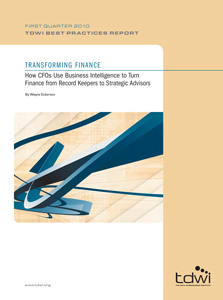
Transforming Finance: How CFOs Use Business Intelligence to Turn Finance from Record Keepers to Strategic Advisors
December 28, 2009
The finance department sits at the information nexus of the organization. It regularly collects financial and non-financial data from every business unit and consolidates that information into summary and detailed management reports. Finance can therefore be a powerful agent of organizational change. It can leverage the information that it collects to assist executives and line of business managers to optimize processes, achieve goals, avert problems, and make decisions.
However, most finance departments have yet to step up and advise the business in a proactive manner. Most are stuck playing a back office role: they are forced to spend too much time producing internal and statutory financial reports, which leaves little time to analyze data and collaborate with business managers about how to improve the business. In the process of producing all these reports, finance teams create information silos, using spreadsheets and other low-cost tools,that interfere with top executives’ ability to obtain a consistent view of enterprise performance.
Forward-thinking finance departments have figured out how to transform themselves from back-office bookkeepers to strategic advisers. They have learned to partner with the IT department—more specifically, the business intelligence (BI) team—whose job is to manage information and deliver a single version of corporate truth. In so doing, they have liberated themselves from manual data collection and report production processes so they can engage in more value-added activities.